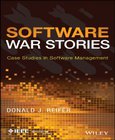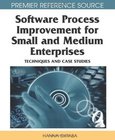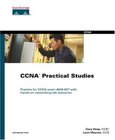Software Studies
A Lexicon
Book Details:
| Publisher: | The MIT Press |
| Series: | MIT Press |
| Author: | Matthew Fuller |
| Edition: | 1 |
| ISBN-10: | 0262062747 |
| ISBN-13: | 9780262062749 |
| Pages: | 352 |
| Published: | Apr 18 2008 |
| Posted: | Nov 19 2014 |
| Language: | English |
| Book format: | |
| Book size: | 3.16 MB |
Book Description:
This collection of short expository, critical, and speculative texts offers a field guide to the cultural, political, social, and aesthetic impact of software. Computing and digital media are essential to the way we work and live, and much has been said about their influence. But the very material of software has often been left invisible. In Software Studies, computer scientists, artists, designers, cultural theorists, programmers, and others from a range of disciplines each take on a key topic in the understanding of software and the work that surrounds it. These include algorithms; logical structures; ways of thinking and doing that leak out of the domain of logic and into everyday life; the value and aesthetic judgments built into computing; programming's own subcultures; and the tightly formulated building blocks that work to make, name, multiply, control, and interweave reality. The growing importance of software requires a new kind of cultural theory that can understand the politics of pixels or the poetry of a loop and engage in the microanalysis of everyday digital objects. The contributors to Software Studies are both literate in computing (and involved in some way in the production of software) and active in making and theorizing culture. Software Studies offers not only studies of software but proposes an agenda for a discipline that sees software as an object of study from new perspectives. ContributorsAlison Adam, Wilfried Hou Je Bek, Morten Breinbjerg, Ted Byfield, Wendy Hui Kyong Chun, Geoff Cox, Florian Cramer, Cecile Crutzen, Marco Deseriis, Ron Eglash, Matthew Fuller, Andrew Goffey, Steve Goodman, Olga Goriunova, Graham Harwood, Friedrich Kittler, Erna Kotkamp, Joasia Krysa, Adrian Mackenzie, Lev Manovich, Michael Mateas, Nick Montfort, Michael Murtaugh, Jussi Parikka, Sren Pold, Derek Robinson, Warren Sack, Grzesiek Sedek, Alexei Shulgin, Matti Tedre, Adrian Ward, Richard Wright, Simon YuillMatthew Fuller is David Gee Reader in Digital Media at the Centre for Cultural Studies, Goldsmiths College, University of London. He is the author of Media Ecologies: Materialist Energies in Art and Technoculture (MIT Press, 2005) and Behind the Blip: Essays on the Culture of Software.
Download Link:
Related Books:
Software War Stories
Case Studies in Software Management
A comprehensive, practical book on software management that dispels real-world issues through relevant case studiesSoftware managers inevitably will meet obstacles while trying to deliver quality products and provide value to customers, often with tight time restrictions. The result: Software War Stories.This book provides readers with practical advice on how to handle the many issues that can arise as a software project unfolds. It utilizes case studies that focus on what can be done to establish and meet reasonable expectations as they occur in government, industrial, and academic settings. The book also offers important discussions on both traditional and agile methods as well as lean development concepts.Software War Stories:Covers the basics of ...
Software Process Improvement for Small and Medium Enterprises
Techniques and Case Studies
Software engineering is of major importance to all enterprises; however, the key areas of software quality and software process improvement standards and models are currently geared toward large organizations, where most software organizations are small and medium enterprises. Software Process Improvement for Small and Medium Enterprises: Techniques and Case Studies offers practical and useful guidelines, models, and techniques for improving software processes and products for small and medium enterprises, utilizing the authoritative, demonstrative tools of case studies and lessons learned to provide academics, scholars, and practitioners with an invaluable research source....
CCNA Practical Studies
Practice for the new CCNA exam #640-801, as well as #640-607, with hands-on networking lab scenariosBuild your own home internetworking lab from the ground up and use it to master essential internetworking skillsSelect Cisco router components and navigate within Cisco IOS(r) SoftwareGain access to Cisco routers and switches and configure a terminal server to access each lab routerConfigure hostnames and set passwordsConfigure router interfaces such as Ethernet, Token Ring, Loopback, and SerialConfigure multiple routing protocols, including RIP, IGRP, and EIGRPImplement route redistribution to share routing information between routing domainsConnect remote offices to the main network with ISDN DDRIntegrate IPX into the networkControl access with stand...
2007 - 2021 © eBooks-IT.org



